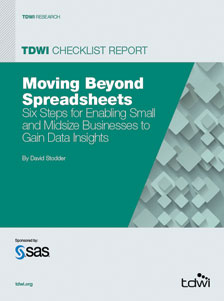
TDWI Checklist Report | Moving Beyond Spreadsheets: Six Steps for Enabling Small and Midsize Businesses to Gain Data Insights
August 1, 2014
Technology trends are moving in a favorable direction for small and
midsize businesses (SMBs) seeking to improve their prowess in
business intelligence (BI) and analytics. Tools are becoming easier to
use for nontechnical users—that is, business users who may know
their data but have neither the training nor the skills to write queries
or provision their data. SMBs are generally defined as organizations
with fewer than 1,000 employees and less than $1 billion in revenue.
Most SMBs do not have the large and experienced IT functions found
in most large organizations to manage data, build data warehouses,
and develop BI and analytics applications. Thus, the evolution of BI
and analytics tools and platforms toward greater ease of use and
deployment has the potential to level the playing field for SMBs as
they compete with larger organizations.
Currently, the most prevalent tools in use within SMBs for accessing,
analyzing, reporting, and presenting data are spreadsheet applications
and reporting tools embedded in point solutions for finance, sales, or
other operations and business management. However, with analytics
becoming a competitive differentiator for SMBs, leadership in these
organizations must determine whether users’ current tools and
platforms for data access, analysis, presentation, and management
are adequate for meeting data-driven decision-making needs. Without
the ability to interact with data effectively, SMB users are at a
disadvantage, especially as business growth, change, and regulatory
duties increase the size of (often scattered) data resources and the
complexity of analytical demands.
Although some SMBs came into being with BI and analytics as part of
their DNA, many firms are only now realizing that they need to reach
higher levels of maturity in how they access, analyze, and share data.
They are making plans to upgrade their capabilities. It can’t be done
all at once; the best approach is to tackle goals gradually, keeping the
deployment of new technologies and methods aligned with business
objectives. To ensure alignment, enterprises need good communication
and collaboration among business and IT leadership.
This TDWI Checklist Report details six areas where SMBs should focus
as they move beyond spreadsheets to improve capabilities for gaining
data insights.